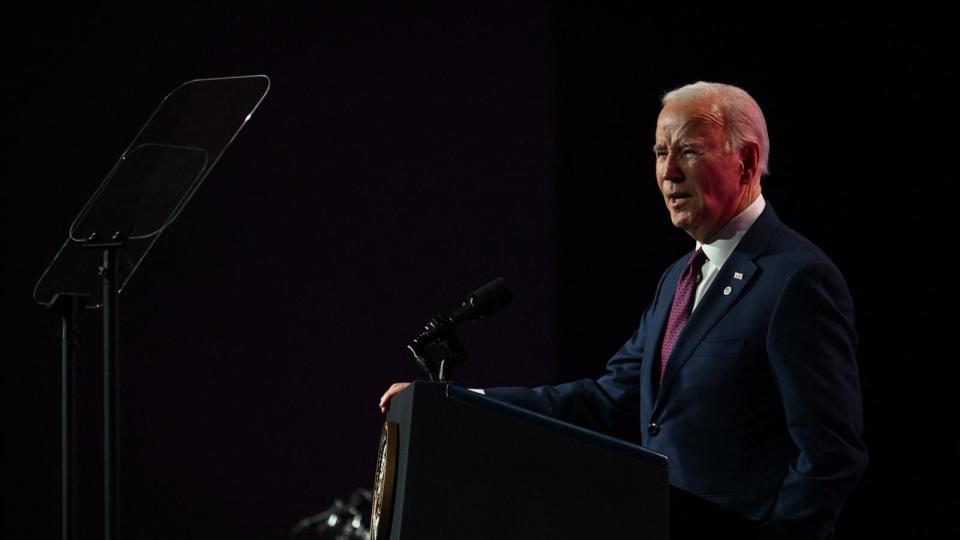What to know about Biden's 2025 budget proposal
President Joe Biden on Monday released his budget for fiscal year 2025, highlighting his efforts to help middle-class Americans get a leg up as the general election kicks off.
The proposals include restoring the expanded Child Tax Credit, bolstering Medicare drug pricing negotiations, national paid family leave programs, affordable housing and more.
The White House argued that Biden's budget would cut the deficit by $3 trillion over the next 10 years, primarily through adjustments to the tax code targeting the ultra-wealthy and cutting to "wasteful subsidies."
MORE: 5 of the biggest moments from Biden's State of the Union speech
The budget release comes days after Biden's State of the Union address, a campaign-style speech in which he focused on contrasting his vision for the country with that of Republicans -- namely his 2024 rival Donald Trump.
"The budget details the president's vision to protect and build on this progress and deliver on the agenda laid out in his State of the Union by lowering costs for families growing the economy from the middle out and bottom up by investing in all America to make sure the middle class has a fair shot and we leave no one behind," Shalanda Young, the director of the Office of Management and Budget, said in a call with reporters.
The policies, however, have little path forward in the currently divided Congress. Lawmakers are responsible for setting the budget, and are still working to fund some key agencies through the rest of this fiscal year.
House Republican leadership, including Speaker Mike Johnson, Majority Leader Steve Scalise, Majority Whip Tom Emmer and Republican Conference Chair Elise Stefanik, quickly dismissed the plan.
"House Republicans reject Biden's misguided budget proposal and have taken action to steer our nation back to a path of fiscal sanity," they said in a joint statement, adding: "The House's budget plan for the next fiscal year, preceding the President's proposal, reflects the values of hardworking Americans who know that in tough economic times, fiscal discipline is non-negotiable. House Republicans understand the American people expect and deserve nothing less from their government."
Asked what in the budget may actually be achievable, the White House declined to get into specifics but said it welcomed working with Republicans on these issues.
"We're going to work across the aisle in good faith to try and get these things done for the American people," deputy press secretary Olivia Dalton told reporters aboard Air Force One as Biden traveled to New Hampshire, where he will deliver remarks on the economy. "We think that the president's agenda is incredibly popular, and we encourage Republicans to join us."
Here is a closer look at what is included in Biden's budget proposal.
Health care savings
The budget proposes increasing the pace of Medicare drug negotiation and bringing more drugs into negotiation sooner after they launch. Last year, the administration named the first 10 prescription drugs that will be subject to negotiations -- medications to treat heart failure, blood clots, diabetes, kidney disease, arthritis, blood cancers and more -- under the Inflation Reduction Act.
MORE: Patients see 1st savings from Biden's drug price push, as Pharma lines up its lawyers
Biden's budget would also expand the IRA's rebates and $2,000 out-of-pocket prescription drug cost cap beyond Medicare and into the commercial market.
It would also extend the $35 cost-sharing cap for a month's supply of insulin to the commercial market.

Child care costs
Biden's plan would restore the expanded Child Tax Credit by an average of $2,600 for 39 million low- and middle-income families.
It would also establish an affordable child care program for families earning less than $200,000 and a national paid leave program of up to 12 weeks for eligible workers.
Plus, it would allocate $8.5 billion to states for Child Care and Development Block Grants -- the primary federal funding source for child care subsidies.
Home ownership tax credits
The budget includes a new tax credit for middle-class first-time homebuyers of up to $10,000 over two years.
Biden also calls on Congress to provide a one-year tax credit of up to $10,000 to middle-class families who sell their starter home to unlock further inventory in the housing market.
The budget would also provide for first-time homebuyers a $5,000 annual mortgage relief credit for two years.
Foreign policy funding
Overall, the president's budget includes $850 billion in discretionary budget authority for 2025 for the Department of Defense -- a 4.1% increase from the previous year.
It also includes a request for unmet needs from the administration's October 2023 supplemental request for urgent security needs through the end of 2024.
Tax changes
The majority of Biden's budget would be paid for by adjustments to taxes, such as reversing the 2017 Trump corporate tax cut. Under Biden's plan, the corporate tax rate would go from 21% back up to 28% -- though it would still be lower than the 35% rate prior to the Trump-era cut.
The proposal also includes a 25% minimum tax on people with wealth of more than $100 million and would deny corporate deductions for all compensation over $1 million for employees, targeting the high wages of some CEOs.
Plus, a 39.6% marginal rate would be applied to households making over $1 million.
What to know about Biden's 2025 budget proposal originally appeared on abcnews.go.com


